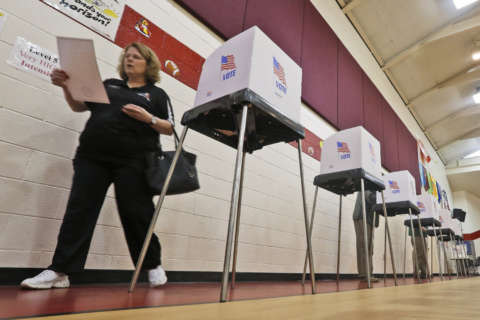Editor’s note: This is one in a series of pieces on the Nov. 6 midterm election. WTOP interviewed candidates in key contested local races. See all of WTOP’s coverage election coverage.
WASHINGTON — The man who rode Tea Party support to oust then-House Majority Leader Eric Cantor in a Republican primary four years ago is now facing a tough race for re-election against a former CIA officer.
Rep. Dave Brat represents Virginia’s 7th Congressional District, covering areas from Culpeper County in the north through Spotsylvania, Orange and Louisa through Richmond’s western suburbs down to Nottoway County.
Brat, a former economics professor at Randolph-Macon, is a member of the conservative House Freedom Caucus.
“When we’re looking at what his record has been in Congress, he hasn’t done a lot for our district,” Democratic nominee Abigail Spanberger said in an interview.
“People across our district are concerned about health care, the rising cost of premiums, the cost of prescription drugs. They are concerned about educational opportunities for their children; they’re concerned about the stability of Social Security and Medicare; they’re concerned about the environmental impact of where we are as a country and what that trajectory is; they’re concerned about gun violence in our schools and in our communities, and our incumbent just has not addressed any of those issues in a meaningful way,” she said.
Spanberger worked for the U.S. Postal Inspection Service, then the CIA until 2014.
“My background is one of service; my background is one focused on solving problems and ensuring that the U.S. government’s making well-informed decisions, and I hope to bring that skill set to Washington to serve central Virginia and this country,” Spanberger said.
Libertarian Joe Walton is also on the ballot, and hopes to grab votes away from both major party candidates.
“Rep. Brat is out of touch with the district, and he has not had town halls and has not been an effective representative and been accountable to the people of the 7th District, and Abigail Spanberger is a good candidate but is too liberal for the district,” Walton said in a separate interview.
Walton is completing a Ph.D. thesis on cryptocurrency and is a former Powhatan County supervisor. “I’m a sensible centrist with a record of accountable and effective leadership in central Virginia,” he said.
Brat, whose campaign did not respond to numerous phone calls or emails requesting an interview, debated Spanberger in Culpeper on Oct. 15.
“I’ve ran on the principles that made this country great,” Brat said in the debate.
He said his successes in Congress include blocking “liberal amnesty” immigration bills and support for tax cuts backed by President Donald Trump.
“The tax cuts passed, and this economy is just booming,” Brat said.
Trump has endorsed Brat in the race. Former President Barack Obama has endorsed Spanberger, who has tried to keep her campaign focused on Brat rather than more national issues.
“A vote for my opponent will be a vote for the Nancy Pelosi liberal agenda,” Brat said, on one of more than a dozen occasions he mentioned the former House speaker during the debate.
“I laughed, at least on the inside,” Spanberger said every time Brat pivoted to it.
“It’s just a typical talking point, and I think it shows just how out of touch with the district my opponent is, and I think how strong our campaign is … that the only critique he has of me is that he wants to compare me to a woman from San Francisco, who I’ve publicly stated multiple times, including in my television commercials, that I won’t be supporting for speaker. [It] just shows how out of touch he is with the campaign that I’m running, who his real opposition is,” Spanberger said.
Brat outlined support for other policies backed by Trump and the House Freedom Caucus, too, including tougher policies on immigration and gangs and reduced regulations on businesses.
“The last couple years, the left has gone off the rails,” Brat said.
Walton, the Libertarian, was not invited to participate in the debate, where he said the back-and-forth went to “ridiculous proportions.”
“Clearly Rep. Brat was trying to nationalize the 7th District and nationalize Ms. Spanberger; she should not have responded to that and should not have gotten so animated and frustrated by that,” Walton said.
(For the record, he said he does not support Nancy Pelosi for speaker either.)
More coverage on the 2018 elections in Virginia:
- Virginia voter guide
- Arlington County board
- US Rep. Brat faces challenges from Spanberger, Walton in Virginia’s 7th
- Kaine faces Stewart, Waters in challenge for Virginia Senate seat
- Comstock faces Wexton in high-profile race for Virginia’s 10th District
- Wittman faces challenge from Williams in Virginia’s 1st District
Like Spanberger, if Walton were to be elected, he promises regular town halls and meetings across the district.
Spanberger describes herself as detail-oriented and excited by policy questions and the opportunity to solve problems on Capitol Hill.
“People keep coming back to the same thing, which is that they want a government that’s actually functioning and they want members of Congress who are focused on addressing their concerns and their issues and not just fighting all the time. So, I do have tremendous hope for what we can see in Congress come January of 2019, when we have a new batch of legislators who are really focused on the needs of their particular districts and the notion that Congress should be serving the people and actually getting work done,” she said.
She also hopes to address gun violence. “It’s having hard conversations about how it is that we can cut down gun violence within our communities through background checks and other straightforward approaches toward limiting violence,” she said.
Walton wants to boost oversight of the Trump administration and get real immigration reform done. “I think we need to have a modernized immigration system: work permit, path to citizenship and a DACA fix. That is not something that Rep. Brat has been advocating for,” he said.
The oversight is crucial, Walton said, because of the ethical issues facing cabinet secretaries and the White House. “That’s one of the primary jobs of Congress is to provide executive branch oversight,” Walton said.
Health care
One of Spanberger’s priorities, which she said she hears about regularly from voters, is ensuring affordable access to quality health care. “That happens through strengthening our current health care system and also, ideally, introducing a public option,” Spanberger said.
Such an option would provide the opportunity to buy into something like Medicare as a regular insurance plan.
“Health care’s the number one issue that we hear across the district. In our suburban communities, that’s predominantly focused on the rising cost of premiums and copays and the cost of prescription drug prices. In our rural areas, those concerns exist as well, in addition to longer-term concerns about the access to medicine and the potential loss of providers,” Spanberger said.
Brat has pushed to repeal the Affordable Care Act and, at the debate, attacked separate proposals not part of Spanberger’s platform for a national single-payer health care system.
He promises Congress will soon work to address the costs of prescription drugs. “We need more competition,” Brat said. “Do you want more federal government or do you want less?” he asked the crowd.
Education, transportation and infrastructure
Brat supports reductions in federal education requirements, such as fewer required standardized tests.
Spanberger sees keeping public funding in public schools to prioritize and strengthen them as key.
For many in the district, though, access is a problem with limited internet available.
Both support some type of broadband expansion.
“Broadband internet access is a major issue for our district. Seven of our 10 counties have really limited, and in some places, no access to broadband internet,” Spanberger said.
It affects not only people living there now, but also the ability to bring in new businesses or residents.
Spanberger lives in Glen Allen, just outside Richmond.
“Living in the Richmond area, I will never complain about traffic having spent some time in Northern Virginia, but … Spotsylvania County is very, very impacted by transportation issues,” she said.
Walton said he had not thought much about transportation plans, but that he might push for roads with traffic backups to get upgrades.
Overall, Walton believes the federal government should not get any bigger. Consistent military budget growth needs to be held in check, Walton said.
“We need a strong national defense … but long-term, the military cannot continue to grow at the pace that it is growing and have all other government services and government needs continue to be cut or to not grow appropriately with the economy and with society,” he said.
Walton would also aim to change Social Security for people who are 10 years or more away from retirement.
Closing pitch
Brat believes America is on the right track, and the federal government should be less involved in nearly everything. “It’s morning in America,” he said at the debate.
“Quite a contrast between [our] two philosophies … one is pro-business; the other is not,” Brat said.
Spanberger disputed that description, and said she supports small businesses, workforce training, strong wages and labor union apprenticeship programs.
“I believe that we need more members of Congress who are committed to understanding the challenges and the concerns facing people across our communities, and we need more members of Congress who are really committed to solving those issues and those problems and addressing them through impactful legislation, and most of all, I want to be representative of this district and engaged in this district and accountable to this district,” Spanberger said.
The diversity of the district — with the majority of the population in suburban areas and the majority of the land covering rural areas — would give her an opportunity to find common ground with members of Congress from many parts of the country, she said.
Despite being a third-party candidate, Walton hopes to win by drawing the middle third of the electorate.
“I think that there are a lot of independent-minded people, voters in the 7th District, who don’t rely on endorsements and certainly wouldn’t necessarily rely on endorsements of the current president or the previous president,” Walton said.
A good result could really make a difference in his view.
“The two-party system has gotten us increasingly polarized politics and has resulted in gerrymandering that reinforces the polarized politics, and so additional voices on the ballot provide the electorate and voters a way to … make a decision about what they think is best for the country — not just on the platforms and issues that the candidates represent, but a referendum on the two-party system and the polarization and gridlock that has resulted from it,” Walton said.






